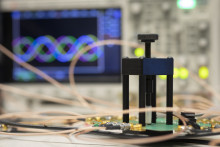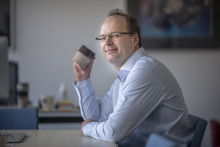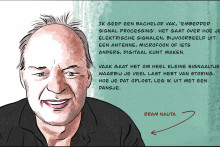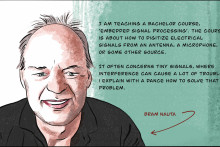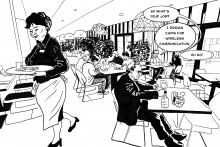Those are the words of Jurriaan Schmitz and Bram Nauta, two UT professors describing their field of expertise: integrated circuits, more commonly known as chips. They discuss why the technology is so crucial for the future and hence why all their graduates receive job offers without even applying.
What is an ‘integrated circuit’?
Nauta: ‘Chips and microchips, electronic circuits integrated on a very small piece of semiconductor material. It is a very complex machine that can be made for very little money. Chips are in everything nowadays. Cars, phones, computers, even lightbulbs. LED is basically a computer that glows. To give my favourite example: if we didn’t use microchips but discrete components that were common in the 1970’s, the iPhone 5S would become bigger than the Eiffel Tower and it would require a huge nuclear powerplant to function as it does.’
Schmitz: ‘Without chips there would be no smartphones, no Facebook, no Internet. We make internet possible. Electronics are in everything and it will only intensify in the future. A century ago everything became electric, now everything is becoming a computer. In the Netherlands we are leading the change and are worldwide an electrical engineering hotspot. All EE-associated companies are looking for thousands of engineers every year. If you study electrical engineering, they offer you a job even without you sending them an application.’
Nauta: ‘True. I have never had a student that could not find a job.’
What does that job look like?
Nauta: ‘It is so cool to be a chip designer. To clarify, my role is of the “architect”, I design what the chip should look like and do. While Jurriaan is more of the “contractor”, he needs to figure out how to build it. We both need each other. I love being a chip designer. You get to design something that is so small that you can’t even see it. You have to imagine everything in your head, you need to have good abstract thinking. But if it works, it makes you feel very smart because you could not check it beforehand. Another advantage of this field is that experience is valued. The older you get, the better you are. It’s not like being a software designer, when there is always someone younger and better than you. Experience counts here.’
Schmitz: ‘That is why we also make sure to always have experienced people in the classroom, people who worked in companies, created something for the real life. That is what I really like about electrical engineering. It is always practical, there is always a clear purpose for what you are developing. You work on challenging problems, solving puzzles step by step until you create something that nobody before you ever made. We can make prosthetic legs for someone, legs that are so smart that they walk by themselves! If you want to build something that doesn’t exist yet, you need electrical engineering.’

What didn’t exist twenty years ago that ICD made possible?
Schmitz: ‘Smartphones of course. Making a video call with a handheld device was considered a complete sci-fi until rather recently.’
Nauta: ‘But we knew the future and we made it possible. We started doing research twenty years ago that you use in your smartphone today. It’s a completely different world now. Twenty years ago you had to print your pictures to look at them, now your camera is a computer. Anybody can do video editing nowadays. That was completely impossible. You had to get a specialist who would physically cut the film and glue it back together. Cars didn’t navigate, there was no OV chipcard, only paper tickets. Getting a flight ticket took days, now you can get it within minutes directly to your email.’
Schmitz: ‘A lot needed to happen behind the scenes to make this possible. Electrical engineering makes everything possible. Google would not exist without it. If you think about it, the biggest companies of today didn’t exist ten years ago. It used to be oil companies and banks ruling the world, now those barely need employees because everything is done digitally.’
Nauta: ‘All because we do our job.’
You were able to foresee the future before. What type of developments will ICD make possible in the time to come?
Nauta: ‘Electronics put into or onto our bodies, connecting our body to the cloud. Apps and phones might disappear.’
Schmitz: ‘We will see smartphones only in movies and laugh about it. We will laugh about this age. You won’t no longer need glasses to correct your eyesight. You can download the “correction”. You can download a different eye colour. Things that sound ridiculous now will be possible thanks to this technology. We need to keep on innovating.’
Nauta: ‘Yes. People often say “But I’m happy with my computer, happy with my phone. I don’t need a better one.” When they say that I ask them to use the computer they had ten years ago. Nobody wants that. Our job is to design the stuff that makes the world better. The more chip designers, the better the world.’
Professor Bram Nauta is the chair of the UT’s Integrated Circuit Design group. Among many other things, he developed the ‘Nauta circuit’, which forms the basis for Bluetooth. In 2014 he received the ‘Simon Stevin Meester’ award, the largest Dutch national prize for achievements in technical sciences, and he is currently the President of the IEEE Solid-State Circuits Society.
Professor Jurriaan Schmitz is the chair of the UT’s Integrated Devices and Systems group. He authored or co-authored over 240 scientific papers, and holds 16 US patents. He served as the editor of IEEE Electron Device Letters and he is an IEEE Senior Member and a member of the Dutch Physical Society.
Read more about Electrical Engineering in our special.


